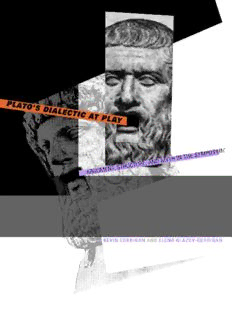Table Of Contentcorrigan.qxp 11/8/2004 3:53 PM Page i
PLATO’S DIALECTIC AT PLAY
corrigan.qxp 11/8/2004 3:53 PM Page iii
PLATO’S DIALECTIC AT PLAY
ARGUMENT, STRUCTURE, AND MYTH IN THE SYMPOSIUM
Image not available
KEVIN CORRIGAN AND ELENA GLAZOV-CORRIGAN
THE PENNSYLVANIA STATE UNIVERSITY PRESS
UNIVERSITY PARK, PENNSYLVANIA
corrigan.qxp 11/8/2004 3:53 PM Page iv
Disclaimer:
Some images in the original version of this book are not
available for inclusion in the eBook.
Library of Congress Cataloging-in-Publication Data
Corrigan, Kevin.
Plato’s dialectic at play :
argument, structure, and myth in the Symposium /
Kevin Corrigan and Elena Glazov-Corrigan.
p. cm.
Includes bibliographical references and index.
ISBN 0-271-02462-3(alk. paper)
1. Plato. Symposium.
2. Plato-Literary art.
I. Corrigan, Elena.
II. Title.
B385 .C67 2004
184-dc22
2003024817
Copyright © 2004The Pennsylvania State University
All rights reserved
Printed in the United States of America
Published by The Pennsylvania State University Press,
University Park, PA 16802–1003
The Pennsylvania State University Press is a member of
the Association of American University Presses.
It is the policy of The Pennsylvania State University Press
to use acid-free paper. Publications on uncoated stock sat-
isfy the minimum requirements of American National
Standard for Information Sciences—Permanence of Paper
for Printed Library Materials, ANSI Z39.48–1992.
corrigan.qxp 11/8/2004 3:53 PM Page v
The Platonic dialogue was the lifeboat in which the ship-wrecked older poetry
saved itself, together with its numerous offspring. Crowded together in a narrow
space and timidly obeying their helmsman Socrates, they moved forward. ...
Plato has furnished for all posterity the pattern of a new art form, the novel,
viewed as the Aesopian fable raised to its highest power.
—Nietzsche,The Birth of Tragedy from the Spirit of Music
The serio-comical genres (especially the Socratic dialogues, and Menippean satire
[including the Satyriconof Petronius]) were the first authentic and essential step
in the evolution of the novel as the genre of becoming.
—Bakhtin,“Epic and Novel:Toward a Methodology for the Study of the Novel”
corrigan.qxp 11/8/2004 3:53 PM Page vi
corrigan.qxp 11/8/2004 3:53 PM Page vii
C O N T E N T S
Acknowledgments xi
Introduction 1
1 Apollodorus’s Prologue: An Imitation of an Imitation 7
1.1 The Historical Frame 7
1.2 Apollodorus and Mimetic Narrative 10
1.3 The Force of Hybris 13
1.4 Malakos versus Manikos: Soft or Mad? 15
1.5 Anachronisms? 18
2 Aristodemus’s Prologue: The Destruction and Transformation of the
Factual Frame of Reference 21
2.1 The Story 22
2.2 Sufficiency and Beauty: Emerging Criteria for Judgment 23
2.3 The Spatial Order? 26
2.4 Mimetic versus Hubristic: The Destruction and
Transformation of the Factual Narrative 28
2.5 Sophistic Education in the Context of Other Dialogues:
Protagoras, Phaedo, Republic 33
2.6 Between Religious Observance and the Cycle of Opposites 37
2.7 “The Father of the Discourse” 39
3 The Order of the Speeches: Formulating the Problem 43
3.1 Eros 44
3.2 Encomium 46
3.3 The Problem of the Significance of the Early Speeches 46
4 From Character to Speech: The Early Speeches and Their Significance 51
4.1 Phaedrus: The Ardent Apprentice, but Confused Mythologue 51
4.2 Pausanias: The Sophistic Sociologue 56
4.3 Hiccups and Eryximachus, the Homogenic Doctor-Scientist 62
4.4 Aristophanes: The Poet as Educator 68
4.4.1 Aristophanes’ Speech and Socrates’ Criticism of
Mimetic Art in the Republic 70
corrigan.qxp 11/8/2004 3:53 PM Page viii
viii Contents
4.4.2 The Possibility of Anachronism and Plato’s
Vanishing Signature 78
4.4.3 Aristophanes’ Speech as a Parody of Philosophical Dialectic 80
4.4.4 Aristophanes’ Speech and Individual Identity 82
4.4.5 Aristophanes’ Hiccups Revisited 85
4.5 Agathon: The Sophistic Theologue as the “Climax” of an
Unselfcritical Tradition 85
4.5.1 Advance over the Previous Speakers? 86
4.5.2 Agathon as Theologue Without Need 92
4.5.3 The Shadow of the “Good”: Agathon’s Portrait in the
Context of the Republic 94
4.6 Conclusion 100
5 Diotima-Socrates: Mythical Thought in the Making 104
5.1 Introduction: The Problem 104
5.2 The Elenchus of Agathon and the Question of Truth 108
5.3 The Role of Diotima 111
5.4 Eros-Daimôn 118
5.5 Diotima and the Art of Mythmaking Revisited:
The Birth of Eros 121
5.6 Love: Relation or Substance? 130
5.7 Rhetoric and Dialectic 133
5.8 Criticism of Aristophanes and Agathon 135
5.9 The Curious Case of Procreation in the Beautiful 137
5.10 The Concluding Sections of the Lesser Mysteries 141
5.11 Preliminary Conclusion 145
6 The Greater Mysteries and the Structure of the SymposiumSo Far 147
6.1 The Movement of Ascent: Structure 148
6.2 The Movement of Ascent and the Earlier Speeches 151
6.3 Immortality and God-Belovedness 158
6.4 Overall Conclusion 159
6.4.1 “Platonic Love”: The View So Far 159
7 Alcibiades and the Conclusion of the Symposium:
The Test and Trial of Praise 163
7.1 The Figure of Dionysus and the Face of Socrates 163
7.2 The Role of Alcibiades 165
7.3 The Test of Praise 168
7.4 The Trial of Praise 176
7.5 Eros, the Tyrant, and His Revelers 179
7.6 Identity and Diversity: The Uniqueness of Socrates 181
corrigan.qxp 11/8/2004 3:53 PM Page ix
CChoanptetenrts iixx
7.7 LogoiOpened Up: An Image for the Symposium? 183
7.8 The Concluding Scenes: Rest and the Self-Motion of
Thought—“Socrates Standing Seeking” 184
8 Conclusion: Plato’s Dialectic at Play 188
8.1 Character, Voice, and Genre 188
8.2 Bakhtin and the Dialogical Character of Novelistic Discourse 197
8.3 The Symposiumas the First “Novel” of Its Kind in History 200
8.4 Plato’s Dialectic at Play: Art, Reason, and Understanding 203
8.5 Plato’s Positive View of Art 215
8.6 Structure, Myth, and Argument 220
8.7 Soul-Body and Human Identity 224
8.8 “Platonic Love” and “Plato” 234
Select Bibliography 241
Index 255
corrigan.qxp 11/8/2004 3:53 PM Page x
Description:The Symposium is one of Plato's most accessible dialogues, an engrossing historical document as well as an entertaining literary masterpiece. By uncovering the structural design of the dialogue, "Plato's Dialectic at Play" aims at revealing a Plato for whom the dialogical form was not merely ornamen

